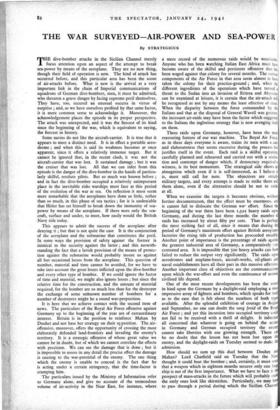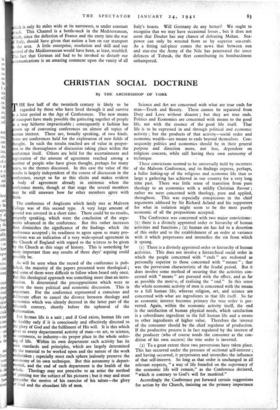THE WAR SURVEYED-AIR-POWER AND SEA-POWER
By STFtATEGICUS
Some navies do not like the aircraft-carrier. It is true that it appears to meet a distinct need. It is in effect a portable aero- drome; and when this is said its weakness becomes at once apparent, since it offers a relatively immense target. But it cannot be ignored that, in the recent clash, it was not the aircraft-carrier that was lost. It sustained damage ; but it was the cruiser that was lost. All that we can infer from this episode is the danger of the dive-bomber in the hands of particu- larly skilful, resolute pilots. But so much was known before ; and in fact the dive-bomber occupied a relatively unimportant place in the inevitable risks warships must face at this period of the evolution of the war at sea. On reflection it must seem more remarkable that the aeroplanes have done so little, rather than so much, in this phase of sea tactics ; for it is undeniable that Hitler has set himself to break down the immunity of sea- power by means of the aeroplane. If there were only the sea- craft, surface and under, to meet, how easily would the British Navy ride today.
This appears to admit the success of the aeroplane after denying it ; but that is not quite the case It is the conjunction of the aeroplane and the submarine that constitutes the peril. In some ways the provision of safety against the former is inimical to the security against the latter ; and this notwith- standing the fact that a lavish provision of the means of protec- tion against the submarine would probably insure us against all but occasional losses from the aeroplane. This question of number, material and time cannot be avoided, for we have to take into account the great losses inflicted upon the dive-bomber and every other type of bomber. If we could ignore the factor of time and material, we might also ignore losses ; but since the relative time for the construction, and the amount of material required, for the bomber are so much less than for the destroyer the exchange of some unknown number of bombers for a number of destroyers might be a sound war-proposition.
It is here that we achieve contact with the second item of news. The particulars of the Royal Air Force offensive against Germany up to the beginning of the year are of extraordinary interest. Britain is in the position to reinforce Mahan by Douhet and not base her strategy on their opposition. The air- offensive, moreover, offers the opportunity of crossing the most elaborately defended land-frontiers and invading the enemy's territory. It is a strategic offensive of whose great value we cannot be in doubt, but of which we cannot correlate the effects with precision. We can see the damage that is done ; but it is impossible to assess in any detail the precise effect the damage is causing to the war-potential of the enemy. The one thing which the enemy is unable to conceal is the fact that he is acting under a certain stringency, that the time-factor is cramping him.
The particulars issued by the Ministry of Information refer to Germany alone, and give no account of the tremendous volume of air-activity in the Near East, for instance, where a mere record of the numerous raids would be wearisome, Anyone who has been watching Italian East Africa must have become aware of the skilful and persistent offensive that bas been waged against that colony for several months. The ), arious components of the Air Force in that area seem almost to have taken the colony for their practice-ground ; and, when the different ingredients of the operations which have turned a threat to the Sudan into an invasion of Eritrea and Abyssinia can be examined at leisure, it is certain that the air-attack Ail be recognised as not by any means the least effective of them When the disparity between the force commanded by the Italians and that at the disposal of General Wavell was greatest the incessant air-raids may have been the factor which suggested to the Italians the inglorious strategy that is now avenging itself on them.
These raids upon Germany, however, have been the most reassuring feature of our war machine. The Royal Air Force, as in these days everyone is aware, trains its men with a care and elaborateness that seems excessive during the process but justifies itself in the event. Each raid is a skilful operation, carefully planned.and rehearsed and carried out with a resolu. tion and contempt of danger which, if democracy required a witness, is its best monument. The strategical side shows an abnegation which even if it is self-interested, as I believe it is, must still call for note. The objectives are strictly military targets, and every attempt is made to strike them and them alone, even if the alternative should be not to strike at all.
When we examine the targets it becomes obvious, without further documentation, that the effect must be enormous, and it cannot fail to dislocate the German wa- effort. Since the beginning of the war there have been 1,522 heavy raids upon Germany, and during the last three months the number of raids has increased by about fifty per cent. That is perhaps the most striking fact of all, since it means that during the period of Germany's maximum effort against British aeroplane factories the rising tide of production has proceeded steadily. Another point of importance is the percentage of raids against the greatest industrial area of Germany, a comparatively on. centrated area. It is impossible that 500 heavy attacks can have failed to reduce the output very significantly. The raids upon aerodromes and seaplane-bases, aircraft-works, oil-plants and naval establishments have all their part in this massive offensive Another important class of objectives are the communications upon which the war-effort and even the continuance of normal civilised life depend.
One of the most recent developments has been the retort in kind upon the Germans by a daylight-raid employing a most impressive array of fighters and bombers, which speaks for itself as to the ease that is felt about the numbers of both types available. After the splendid exhibition of courage in August and September, no one can doubt the sang froid of the Royi Air Force ; and yet this incursion into occupied territory could not fail to be received with a thrill of delight. It informed all concerned that whatever is going on behind the scend in Germany and German occupied territory the enetal cannot take liberties with our growing strength. There Gil be no doubt that the lesson has not been lost upon the enemy, and the daylight-raids on Tuesday seemed to make the admission.
How should we sum up this duel between Douhet a Mahan? Lord Chatfield said on Tuesday that the Nays thought it could beat the bomber ; and, certainly, it must seen that a weapon which in eighteen months secures only one Jar ship is not of the first importance. What we have to face is t prospect of mass-attacks in the future which will probably m the early ones look like skirmishes. Particularly, we may ha to pass through a period during which the Sicilian Chann hih is only 8o miles wide at its narrowest, is under constant tack. This Channel is a bottle-neck in the Mediterranean, .ich, since the defection of France and the entry into the war Italy, should have given that nation a lien on cur transport the area. A little enterprise, resolution and skill and our ntrol of the Mediterranean would have been, at least, troubled. he fact that German aid had to be invoked to disturb our mmunications is an amazing comment upon the vanity of all Italy's boasts. Will Germany do any better? We ought to recognise that we may have occasional losses, but it does not seem that Douhet has any chance of defeating Mahan. Sea- power can only be wrested from us by superior sea-craft. As a fitting tail-piece comes the news that between sun and star-rise the Army of the Nile has penetrated the inner defences of Tobruk, the fleet contributing its bombardment unhampered.































 Previous page
Previous page